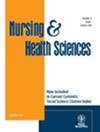护士为 COVID-19 患者提供临终护理的经验:一项描述性现象学研究
IF 2.1
3区 医学
Q2 NURSING
引用次数: 0
摘要
感染 COVID-19 的重症患者死亡率一直居高不下。国家和机构的感染控制政策以及大流行造成的资源短缺导致患者在没有尊严的情况下死亡,并不可避免地改变了重症监护病房(ICU)的临终关怀(EOLC)实践。本研究探讨了 ICU 护士为 COVID-19 死亡患者提供临终关怀的经验。八名护士参与了定性现象学研究。研究人员于 2022 年 7 月至 9 月进行了半结构化访谈。研究采用Colaizzi数据分析方法,得出以下四个主题:(i) 死亡旅程中的唯一陪伴者;(ii) 帮助家属为死亡做好准备;(iii) 被困在框架内的EOLC;(iv) 回想中的EOLC。为了确保重症监护病房中高质量的临终关怀,必须促进对护士的实际支持以及与临终关怀相关的讨论/教育。应加强技术支持,如数字通信技术,以帮助患者及其家属参与生命终结治疗。本文章由计算机程序翻译,如有差异,请以英文原文为准。
Nurses' experience of end‐of‐life care for patients with COVID‐19: A descriptive phenomenology study
求助全文
通过发布文献求助,成功后即可免费获取论文全文。
去求助
来源期刊
CiteScore
4.80
自引率
3.70%
发文量
91
审稿时长
6-12 weeks
期刊介绍:
NHS has a multidisciplinary focus and broad scope and a particular focus on the translation of research into clinical practice, inter-disciplinary and multidisciplinary work, primary health care, health promotion, health education, management of communicable and non-communicable diseases, implementation of technological innovations and inclusive multicultural approaches to health services and care.

 求助内容:
求助内容: 应助结果提醒方式:
应助结果提醒方式:


